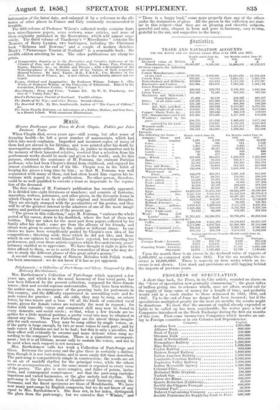Tams Posthunies pour Piano de Fred. Chopin. Puhlies par Jules
Fontana. Paris.
When Chopin died, seven years ago-still young, but after. years of decaying health-he left a great number of manuscripts, which had fallen into much confusion. Imperfect and incorrect copies of many of them had got abroad in his lifetime, and were printed after his death by unscrupulous music-sellers. His family, in justice to themselves and to the memory of their lamented relative, resolved that a selection from his posthumous works should be made and given to the world; and, for this purpose, obtained the assistance of M. Fontana, the eminent Parisian professor, who had been Chopin's friend from childhood, and enjoyed his utmost confidence to the end of his life. Chopin was in the habit of keeping his pieces a long time by him ; so that M. Fontana was well acquainted with many of them, and had often heard him express his in- tentions with regard to their publication. No other person, therefore, could be so well qualified to execute a trust so important to the reputa- tion of the deceased.
The first volume of M. Fontana's publication has recently appeared. It is divided into eight livraisons or numbers; and consists of fantasias, mazurkas, waltzes, polonaises, and other pieces, in the favourite forms in which Chopin was wont to clothe his original and beautiful thoughts. They are strongly stamped with the peculiarities of his genius, and they will be of the greatest interest to the admirers of one of the most imagi- native and poetical composers of the present age.
"The pieces in this collection' " says M. Fontana, "embrace the whole peliod of his career, down to his deathbed, where the last of them was written. They are taken for the most part from papers collected by his family after his death ; some are from the albums of his friends, and others were given to ourselves by the author at different times. In our choice we have been scrupfilously guided by Chopin's own idea of his compositions ; throwing aside those which he did not lace, and those which in our opinion he would himself have rejected, but respecting his preferences, and even those artistic caprices which five-and-twenty. years' intimacy enabled us to appreciate. We have thought it right to give the dates affixed to them, so as to assist the researches of those who may de- sire to study the different phases of this great artist's genius."
A second volume consisting of Sixteen Melodies with Polish words, has been announced : we do not know if it has as yet appeared.


































 Previous page
Previous page